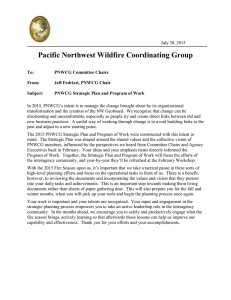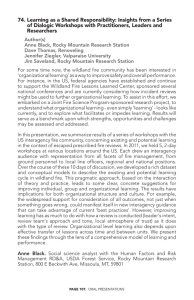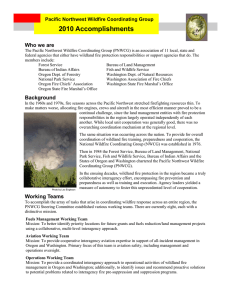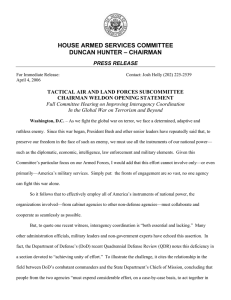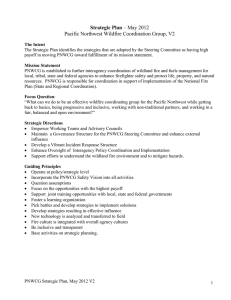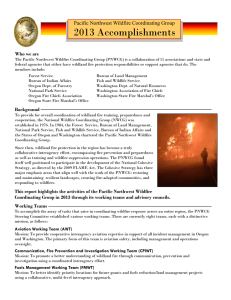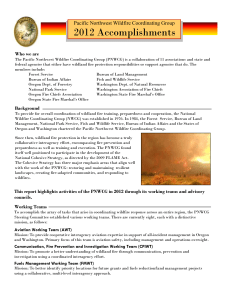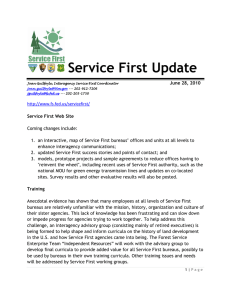2011 Accomplishments Pacific Northwest Wildfire Coordinating Group Who we are
advertisement
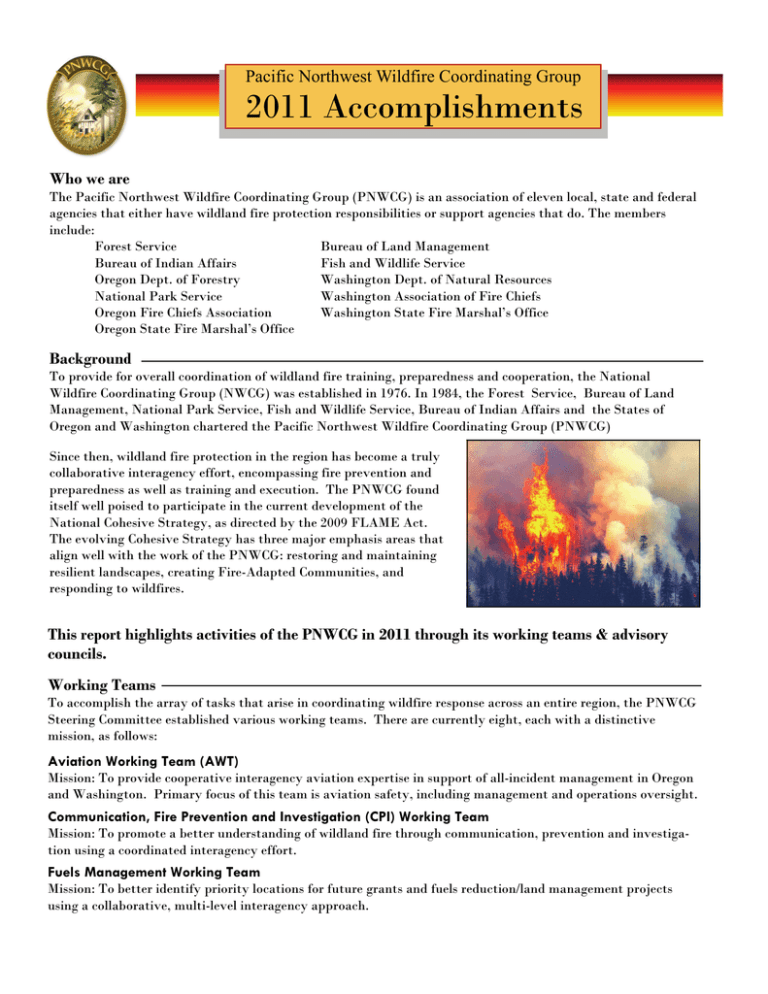
Pacific Northwest Wildfire Coordinating Group 2011 Accomplishments Who we are The Pacific Northwest Wildfire Coordinating Group (PNWCG) is an association of eleven local, state and federal agencies that either have wildland fire protection responsibilities or support agencies that do. The members include: Forest Service Bureau of Land Management Bureau of Indian Affairs Fish and Wildlife Service Oregon Dept. of Forestry Washington Dept. of Natural Resources National Park Service Washington Association of Fire Chiefs Oregon Fire Chiefs Association Washington State Fire Marshal’s Office Oregon State Fire Marshal’s Office Background To provide for overall coordination of wildland fire training, preparedness and cooperation, the National Wildfire Coordinating Group (NWCG) was established in 1976. In 1984, the Forest Service, Bureau of Land Management, National Park Service, Fish and Wildlife Service, Bureau of Indian Affairs and the States of Oregon and Washington chartered the Pacific Northwest Wildfire Coordinating Group (PNWCG) Since then, wildland fire protection in the region has become a truly collaborative interagency effort, encompassing fire prevention and preparedness as well as training and execution. The PNWCG found itself well poised to participate in the current development of the National Cohesive Strategy, as directed by the 2009 FLAME Act. The evolving Cohesive Strategy has three major emphasis areas that align well with the work of the PNWCG: restoring and maintaining resilient landscapes, creating Fire-Adapted Communities, and responding to wildfires. This report highlights activities of the PNWCG in 2011 through its working teams & advisory councils. Working Teams To accomplish the array of tasks that arise in coordinating wildfire response across an entire region, the PNWCG Steering Committee established various working teams. There are currently eight, each with a distinctive mission, as follows: Aviation Working Team (AWT) Mission: To provide cooperative interagency aviation expertise in support of all-incident management in Oregon and Washington. Primary focus of this team is aviation safety, including management and operations oversight. Communication, Fire Prevention and Investigation (CPI) Working Team Mission: To promote a better understanding of wildland fire through communication, prevention and investigation using a coordinated interagency effort. Fuels Management Working Team Mission: To better identify priority locations for future grants and fuels reduction/land management projects using a collaborative, multi-level interagency approach. Pacific Northwest Wildfire Coordinating Group 2011 Accomplishments Geographic Information Systems (GIS) Working Team Mission: To provide efficient and effective ways to meet fire program needs for geospatial information through an interagency forum, and to develop a process for coordination of interagency sponsored geospatial information initiatives. The GIS Working Team will work to support and implement strategic and tactical applications of GIS for the Pacific Northwest wildland fire community. Incident Business Practices Working Team (IBP WT) Mission: To provide an efficient, effective, coordinated interagency approach to the fire business management activities of wildland fire protection agencies in Oregon and Washington. Operations Working Team (OWT) Mission: To provide a coordinated interagency approach to operational activities of wildland fire management in Oregon and Washington; additionally, to identify issues and recommend proactive solutions to potential problems related to interagency fire pre-suppression and suppression programs. Safety and Health Working Team (SH WT) Mission: To improve firefighter health, safety and effectiveness through emphasis on excellence in workforce development, leadership and the establishment of standards based on principles within a developing safety culture. Through data collection and analysis the team will validate and prioritize safety issues for resolution and communication to the field and management. Training Working Team (TWT) Mission: To provide a coordinated, interagency approach to fire management training in the Pacific Northwest geographic area. Advisory Councils Four advisory councils provide advice to the PNWCG: Incident Commander Advisory Council Fire Environment Advisory Council Fire Program Analysis Advisory Council Northwest Center Managers Advisory Council Incident Commander Advisory Council (IC AC) Mission: To serve the PNWCG as a body of resident experts, providing advice, and developing recommendations, processes and procedures to improve the consistency and performance of geographic area Interagency Incident Management Team (IMT) operations. Inside Story Headline Fire Environment Advisory Council (FEN AC) Mission: To provide interagency, strategic vision and direction relating to measuring, analyzing and predicting the Pacific Northwest wildland fire environment. Fire Program Analysis Advisory Council (FPA AC) Mission: To provide advice, monitoring and assistance to field units in the interagency implementation of Fire Program Assessment (FPA). FPA is an interagency analysis that includes an aggregation of all lands being considered in the analysis called a Fire Planning Unit (FPU). Interagency FPUs have been identified in the Pacific Northwest and are listed in the Advisory Council Program of Work. Northwest Center Managers Advisory Council (NWCM AC) Mission: To develop a formal interagency structure that would provide consistent oversight and organization to matters concerning the governance and operation of the Interagency Dispatch Coordination System. 2 Pacific Northwest Wildfire Coordinating Group 2011 Accomplishments What We Accomplished Here are some of the key working team accomplishments in 2011: Sponsored the Interagency Fire Crew Agreement through the Oregon Department of Forestry. (IBP WT) Working together, three teams finalized a map product inventorying all Federal National Fire Plan grant hazardous fuels reduction projects from 2001 to present. (Fuels, GIS and CPI WTs) Coordinated a regional Incident Business/Fire Procurement Workshop attended by over 150 people. (IBP WT) Maintained a contact list for Pacific Northwest Public Information Officers and provided key updates by email. (CPI WT) Reassessed and modified the standard support cost rates for interagency cost-share agreements. (IBP WT) Coordinated with the PNW Prevention Conference work group, providing input and support. (CPI WT) Focused on capacity building through increased skills by offering advanced cost and I-Suite training courses. (IBP WT) Refined the Incident Business and Procurement Working Team website to make it more user friendly for agency employees and the public. (IBP WT) Compiled regional success stories to accompany the Cohesive Strategy. (Fuels WT) Led the 2011 Community Assistance Grants process, awarding approximately $1.7 Million. (Fuels WT) Here are some of the advisory council accomplishments in 2011: Led PNW IMTs in incorporating a deliberate risk-assessment process in team planning and decision making. (IC AC) Led IMTs in utilizing standardized medical response procedures to provide consistency to firefighters on incidents. (IC AC) Began identifying opportunities for improving interagency dispatch coordination through factors that critically influence a dispatch center’s capability to successfully meet interagency workload demands. (NWCM AC) Created a uniform reporting standard that will facilitate daily shared resource status reporting through an Internet-based program applicable to all dispatch centers in the Pacific Northwest. (NWCM AC) Identified standard protocols and procedures for the safety and welfare of dispatch staff and operations personnel, ensuring effective dispatch operations during critical incidents. (NWCM AC) Planned and hosted a workshop on fire behavior and fire weather patterns specific to the Pacific Northwest, as well as fire modeling. This led to the development of a partnership with the International Association of Fire Ecology for planned 2012/2013 sessions. (FEN AC) The Oregon GeoBoard has been chartered and staffed to provide a new level of leadership and guidance to Oregon’s four interagency Type Two IMTs. (OWT with Support from the IC AC) Continued to lead the development of succession plans for all Pacific Northwest IMTs. (OWT with Support from the IC AC) 3
